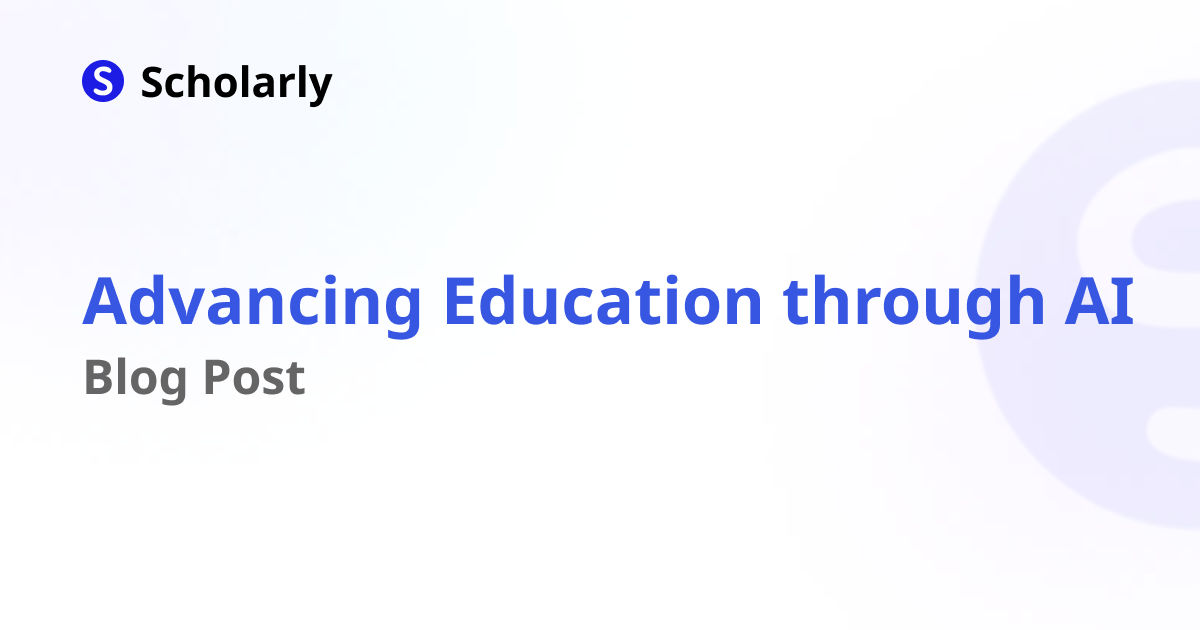Advancing Education through AI and ChatGPT
Learn how AI and ChatGPT are transforming education and driving advancements in the learning process.

Artificial Intelligence (AI) and ChatGPT are transforming education and driving advancements in the learning process. In this blog post, we will explore how AI and ChatGPT are revolutionizing education.*
The Power of AI and ChatGPT in Education
AI and ChatGPT technologies have the potential to greatly enhance education by offering innovative solutions for various learning tasks. Here are some key ways in which AI and ChatGPT are advancing education:
1. Intelligent Content Generation
AI-powered tools like Scholarly leverage natural language processing and machine learning to automatically generate educational content, such as flashcards and notes, from source materials. This automation saves time for educators and ensures the inclusion of relevant concepts.
2. Personalized Learning Experiences
AI algorithms analyze learners' performance and preferences to provide personalized learning experiences. By adapting the content, difficulty level, and pacing to individual needs, AI-powered systems optimize the learning process and improve knowledge retention.
3. Interactive and Engaging Learning
ChatGPT, a conversational AI model, enables interactive and engaging learning experiences. Students can ask questions, seek explanations, and receive instant responses, promoting active participation and deeper understanding.
4. Efficient Review and Practice
AI-powered systems employ smart spaced repetition techniques to schedule review sessions for optimal knowledge retention. By identifying knowledge gaps and reinforcing learning at the right intervals, AI helps students practice more efficiently.
The Benefits of AI and ChatGPT in Education
The integration of AI and ChatGPT in education offers several advantages that contribute to enhanced learning outcomes:
1. Improved Accessibility
AI-powered tools can provide accessible learning experiences for students with diverse needs. ChatGPT's ability to generate human-like responses and adapt to individual learning styles caters to a wide range of learners.
2. Enhanced Collaboration and Feedback
ChatGPT enables collaborative learning environments where students can interact with the AI model and with each other. This fosters peer collaboration, enables instant feedback, and promotes knowledge sharing among students.
3. Intelligent Data Analytics
AI-based educational platforms can collect and analyze vast amounts of student data, providing valuable insights into learning patterns, performance trends, and areas that require additional attention. This information can inform personalized interventions and instructional improvements.
Embracing the Future of Education
As AI and ChatGPT continue to advance, their potential impact on education is vast. By leveraging AI technologies, educators and students can benefit from intelligent content generation, personalized learning experiences, interactive engagement, and efficient review processes.
It's important to recognize that while AI and ChatGPT offer tremendous opportunities, their use in education should be guided by ethical considerations and responsible practices to ensure fairness, privacy, and security for all learners.
Try Our Popular AI Study Tools
Transform your study materials into interactive learning experiences with our most popular AI-powered tools:
PDF to Flashcards
Convert lecture notes and textbooks into study flashcards instantly
Text to Flashcards
Turn any text or notes into comprehensive flashcard sets
Image to Flashcards
Convert diagrams and handwritten notes into digital flashcards
YouTube to Flashcards
Generate flashcards from educational video content



